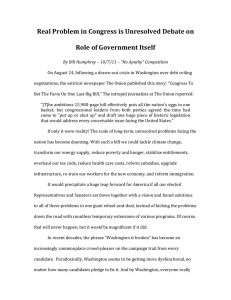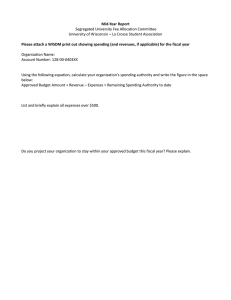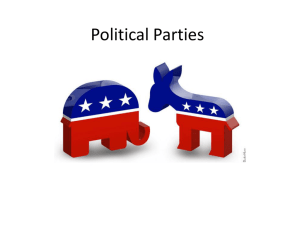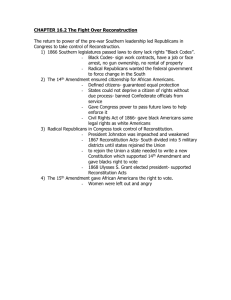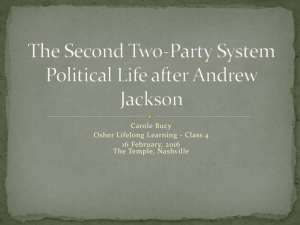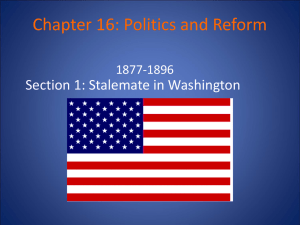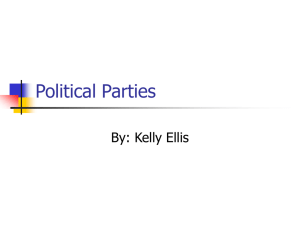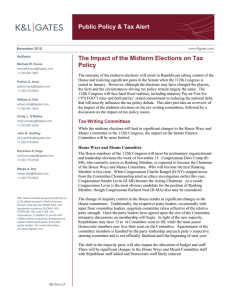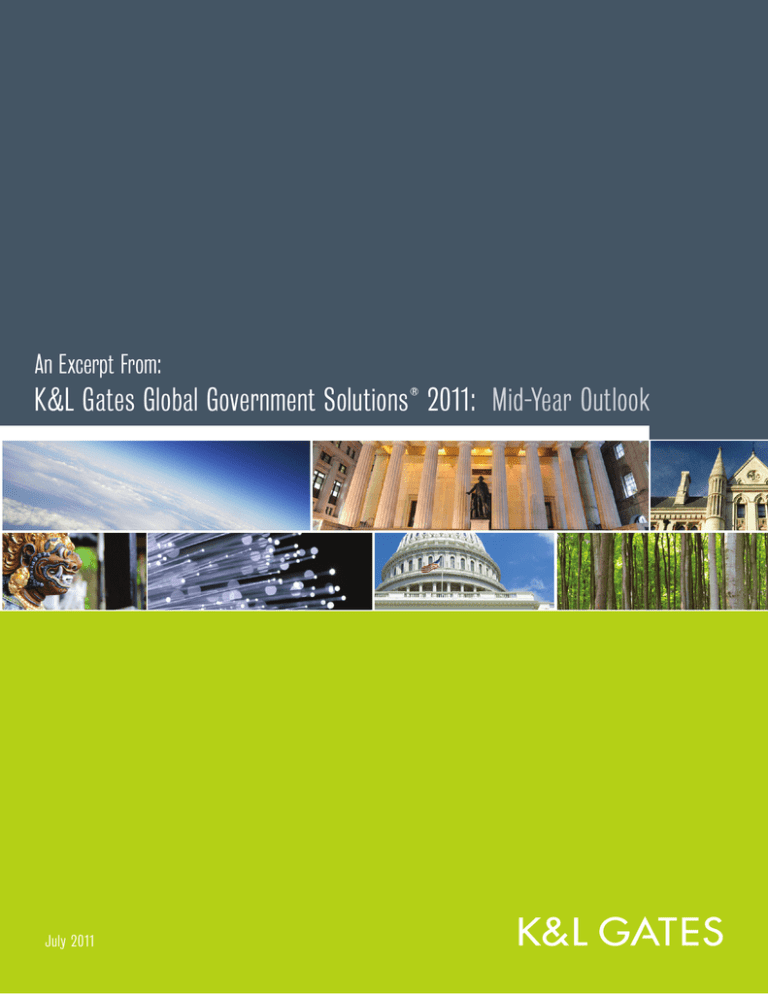
An Excerpt From:
K&L Gates Global Government Solutions ® 2011: Mid-Year Outlook
July 2011
Policy and Politics
The U.S. Budget Debate:
Gridlock and Catastrophe, or Compromise and Solution?
When the earth shook last November on Election Day, almost 90 freshman
Republicans were elected to the U.S. House of Representatives, and a new
majority was born. While the Democrats maintained control of the U.S. Senate,
they have only a slim majority and thus are virtually unable to pass bills without
Republican help.
What could cause such a massive shift in
political power in Washington? Debt! All
across the country people were dealing
with their own fiscal problems by cutting
back and saving money. They did not see
the government taking those seemingly
common-sense steps. While some leaders
in Washington argued that the stimulus
package was too small, almost $800
billion was spent to stimulate the economy,
and it only seemed to get worse.
With a divided government—a
Democrat in the White House and the
Congress split between Republicans
and Democrats—many pundits foresaw
gridlock at its worst and no solution
to the country’s growing financial
problems. There is another way to look
at this situation, however: with divided
government both parties can claim some
credit for good things that happen. It is
42
important to remember that the only time
we have had a balanced budget in the
last 40 years was in the late 1990s,
when President Clinton, a Democrat, and
a Republican Congress made it happen.
Divided government is back, and it may
be a good thing for the United States.
Consider that in the lame duck session
completed last December just before
the Republicans took control of the
House, the Bush tax cuts were about
to expire. The President wanted to
extend unemployment insurance and
the Bush-era middle class tax cuts. The
Republicans wanted to extend all of the
tax cuts, including those on upper income
taxpayers that the President opposed.
Both parties identified what they
needed to make a deal, and both gave
something to get it. Both won!
K&L Gates Global Government Solutions ® 2011 Mid-Year Outlook
The next big hurdle was funding the
government for the remainder of the
2011 fiscal year. The Congress had
been unable to clear the appropriation
bills before the end of the last Congress.
Now with a new reality in the House
and a total focus on cutting back on the
size of government, Republicans wanted
to dramatically reduce spending. They
were prepared to allow the government
to limp along week to week without any
long-term (i.e., six-month) agreement. The
President made the argument that you
cannot govern on a week-to-week basis
and thus we needed resolution and clarity.
Republicans argued that the country was
broke and that if the President wanted his
budget they would have to negotiate a
price. Thus, billions of additional dollars
in spending were cut, and an agreement
was reached. Both claimed victory, just as
they had in December.
The next major battle is the debt ceiling.
Normally this is a non-controversial
issue because the legislature is required
to pass a measure that allows the
government to borrow more money
Policy and Politics
to pay its obligations. Currently the
federal government can only raise about
60 percent of the money it needs to
spend through general taxes. Treasury
Secretary Geithner announced in April
that the United States had reached its
legal borrowing limit. He also stated that
by borrowing from federal employees’
pension funds he could forestall forfeiture
until perhaps the beginning of August.
Perhaps coincidentally, Congress would
begin its summer recess at that time;
it may not be a coincidence because
Congress, like much of humanity, will put
off tough decisions until the last moment,
and the desire to get out of the brutal heat
of Washington for the joys of home and
family may provide the needed deadline
for action.
In all likelihood this issue will be resolved
on or about midnight on August 5th or
6th. While there is always the possibility
that the Congress will be more proactive,
history is a great teacher. At the time of this
writing there is some talk but little action.
The most likely outcome is that the debt
ceiling will be raised, but possibly only
enough to get through the year, which will
create yet another doomsday scenario
at the end of the fiscal year, unless a
strategic budget deal can be reached
encompassing mandatory spending
(particularly entitlement programs such as
Medicare, Medicaid, and Social Security)
as well as discretionary spending.
Appropriations bills will have to be
passed to fund the next fiscal year,
and there will be heated debate about
Medicare, Medicaid, and Social
Security, which account for two-thirds
of the spending in the U.S. budget. The
Democrats will want to raise revenues
(taxes), the Republicans will not. The
Democrats will argue to maintain the
status quo on the entitlement programs,
and Republicans will be portrayed as
evil Scrooges hurting kids and old folks.
The result? Deadlock; gridlock, possibly.
But the history of divided government
suggests a solution may be found. This
political chemistry coupled with an
electorate focused on the fiscal health
of the nation and the possibility of a
diminished future for their children give
hope that compromise will come. And
both sides and the country can win.
James T. Walsh (Washington, D.C.)
jim.walsh@klgates.com
K&L Gates Global Government Solutions ® 2011 Mid-Year Outlook
43
Anchorage Austin Beijing Berlin Boston Brussels Charlotte Chicago Dallas Doha Dubai Fort Worth Frankfurt Harrisburg Hong Kong
London Los Angeles Miami Moscow Newark New York Orange County Palo Alto Paris Pittsburgh Portland Raleigh Research Triangle Park
San Diego San Francisco Seattle Shanghai Singapore Spokane/Coeur d’Alene Taipei Tokyo Warsaw Washington, D.C.
K&L Gates includes lawyers practicing out of 38 offices located in North America, Europe, Asia and the Middle
East, and represents numerous GLOBAL 500, FORTUNE 100, and FTSE 100 corporations, in addition to growth
and middle market companies, entrepreneurs, capital market participants and public sector entities. For more
information about K&L Gates or its locations and registrations, visit www.klgates.com.
This publication is for informational purposes and does not contain or convey legal advice. The information herein should not be used or relied upon in regard to
any particular facts or circumstances without first consulting a lawyer.
©2011 K&L Gates LLP. All Rights Reserved.

